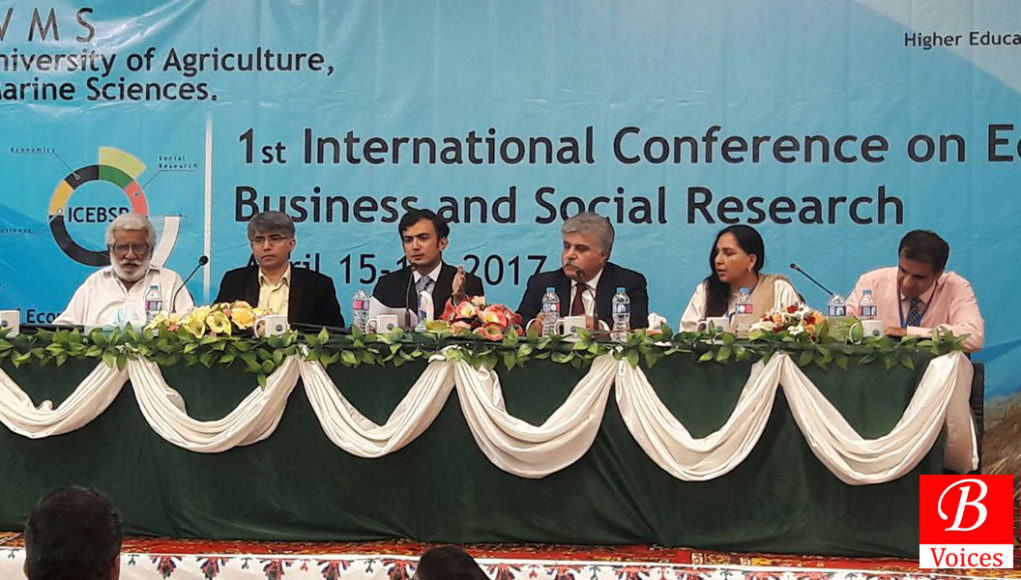Adnan Aamir
In modern world, universities play a fundamental role in transforming the lives of people. Establishing and running universities on sustainable basis is part and parcel for human development. In that backdrop, Lasbela University of Agriculture, Water and Marine Sciences (LUAWMS) was established in 2006 in Uthal town of District Lasbela of Balochistan. It was the fifth university of the province and first in category of Agriculture, Water and Marine Sciences.
Situated 125 km North of Karachi, this university successfully conducted its first ever international academic conference. International Conference on Economics, Business and Social Research (ICEBSR) was held on 15th and 16th April. The conference comprised of Keynote Addresses and parallel technical sessions on topics related to Economics, Business and Social Research. Scholars from all over Pakistan attended the conference. However the visit to this university revealed that how it has been ignored and disowned by political leadership.
Read Also: CPEC: An Economic Giant or a Hornets’ Nest
Federal Minister Ahsan Iqbal was supposed to be the chief guest in the inaugural session of the conference. However he didn’t show up and also did not bother to send someone from his ministry in his place. Higher Education Commission (HEC) was partly sponsoring the conference and representatives from HEC didn’t take the pain of attending the conference either. This was a huge discouragement for a remotely located university in Balochistan which was holding its first major conference.
The federal government always ignores Balochistan but the provincial government and local representatives of Lasbela didn’t treat this conference any different from the federal government. The speech of the Vice Chancellor (VC) of University and conversations with faculty members and university staff revealed inconvenient realities. This university land area comprises of 400 acre and it doesn’t have a boundary wall. It doesn’t have its own resources to build that wall and the provincial government and members of assembly from Lasbela are not concerned about it either. This is a potential security loophole given the threats to educational institutes in the country, but who cares!
Moreover, there are two members of Provincial Assembly and one member of National assembly from Lasbela in addition to minority parliamentarians elected on reserved seats. The visit of Lasbela in general and that of LUAWMS in particular reveals that these political representatives do not own the university. They only take interest in the university at the time of recruitment and that’s it. They don’t take interest in conferences or fulfilling the basic needs of the university such as boundary walls. That’s rather unfortunate and such public representatives should be held accountable.
Likewise, the provincial government of Balochistan had also imposed a so-called educational emergency in the province. Other than a few positive changes the educational emergency proved to be a political gimmick and ignorance of universities such as LUAWMS are an example of that. Higher education is not a priority of provincial government and that’s why universities don’t get any funds from the provincial exchequer.
Balochistan government has not formed its own provincial Higher Education Commission after 18th Amendment and that’s why the Governor Office has the authority to meddle in the affairs of universities. LUAWMS is also a victim and the word is that sometime back the vehicles of LUAWMS were in personal use of officials of Governor House. That’s totally unfair and its one more reason that governor should be relived of charge of universities by establishing provincial higher education commission in Balochistan.
Since the conference was about Economics primarily, therefore it was not possible to not discuss the China-Pakistan Economic Corridor (CPEC). There were more than one sessions on CPEC where the panelists and participants discussed different issues about the so-called game changer in detail. The gist of discussion on CPEC was that human resources define development, not roads and infrastructure. Federal government was criticized for not sharing the complete agreements on CPEC in detail. However, this scribe felt that the potential negative aspects of CPEC were downplayed in the conference. Another important thing to share is that panelists who belonged to the Academic sector were over-apologetic about CPEC, which is not a promising trend because universities are supposed to be nurseries for critical thought.
Coming back to the conference, as already mentioned, it was a first time initiative by university administration but it had certain shortcomings which need to be highlighted. Firstly, this conference hardly had any international presenter so why was it called an ‘international conference’? A conference can be called international only when it has substantial number of international participants. Sardar Bahadur Khan Women’s University (SBKWU) committed the same mistake while using the prefix international with its Media and Social Sciences conference as international when the only international dimension was a video lecture by a foreign participant. A conference can still be a successful one even if it’s a national one, there is no need to forcefully make it international.
Secondly, there were problems relating to the selection of panelists in panel discussions. High profile participants were dropped out at last moment and new ones were introduced at eleventh hour which made it difficult for the moderators to change their plans. However university can be discounted for these shortcomings as this was the first such conference it was conducting.
Bottom line is that future of Balochistan depends upon the success of universities imparting education in remote areas of Balochistan such as LUAWMS. These institutes needs to be supported by people from every walk of life. Government of Balochistan and local representatives of Lasbela need to realize their responsibility towards LUAWMS and provide it the much needed support.
Originally published in The Nation
Share your comments!








